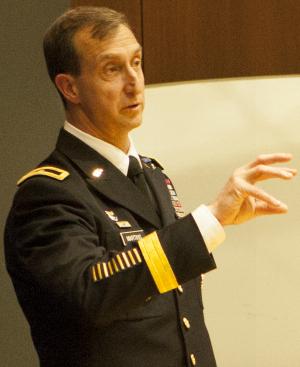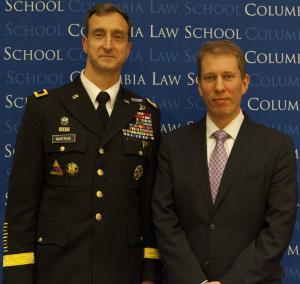Chief Prosecutor of U.S. Military Commissions Speaks About Reforms to War Crimes System
Army Brigadier General Mark Martins Defends Commission Process at Event Sponsored by the Roger Hertog Program on Law and National Security
New York, December 3, 2012—Criticism of U.S. military commissions, while not unfounded, is outdated, Army Brigadier General Mark Martins told Columbia Law School students, faculty, and guests on Nov. 28, in a presentation on the legal protections afforded to accused war criminals under the Military Commissions Act of 2009.
| Brigadier General Mark Martins |
Military commissions are military courts of law used to try individuals for unlawful conduct associated with war. After the U.S. Supreme Court found in multiple cases that the commission process violated international law and the rights of the accused, Congress passed the 2009 Military Commissions Act to reform the system. Martins is chief prosecutor of the Office of Military Commissions for the United States.
In a prior position as Executive Secretary of an inter-agency Detention Policy Task Force, Martins worked on the statutory reforms that ultimately became part of the 2009 Act. So too did Professor Trevor W. Morrison ’98, who at the time was serving as Associate White House Counsel. Morrison, the Isidor and Seville Sulzbacher Professor of Law and co-chair of the Roger Hertog Program on Law and National Security, which sponsored Martins’ appearance, introduced Martins at Wednesday’s lecture. The Hertog Program hosts a series of events that engage leading government practitioners and legal scholars on contemporary national security issues.
Morrison said Martins’ promotion to brigadier general in 2009 was one of the most extraordinary events he witnessed in Washington, D.C., during his last stint in the federal government. “It was a wonderful ceremony but it was also rare,”
| Professor Trevor W. Morrison '98 |
Morrison said, because it took place in the Great Hall at the Department of Justice and included a presentation by Attorney General Eric H. Holder, Jr. “Military officers do not have promotion ceremonies in the civilian Department of Justice every day or even every year or even every decade. In part, this reflects the uniquely high esteem in which General Martins is held across the government by civilians and military officials alike.”
Morrison added that the “mixing” of civilian and military personnel at the ceremony is also symbolic of the functional overlap between the two spheres in various parts of modern government, like in military commissions. Commission cases are subject to appeal to civilian federal courts, including ultimately the U.S. Supreme Court.
In his nearly hour-long talk, Martins defended the commission process. He said military commissions are the product of vast amounts of legal precedent and the efforts of people who aim to uphold America’s values. The commissions are modeled after the military justice system by which U.S. servicemen and women are tried when accused of violating the law.
“It’s a revered system; it’s a good system; it’s the one I’ve practiced in all my life,” said Martins, the lead trial counsel in the prosecution of Khalid Sheikh Mohammad and four other accused perpetrators of the attacks of September 11, 2001.
Martins described the protections afforded to military prisoners, countering what he called the six “uns” against commissions: that they are unfair, unsettled, unknown, unbounded, unnecessary, and un-American.
Among other safeguards, some of which were laid out in the Military Commissions Act of 2009, detainees are assumed innocent, provided competent counsel, entitled to notice of the charges against them, and protected against self-incrimination and the use of evidence obtained through torture, Martins said.
| Brigadier General Mark Martins, left, and Professor Trevor W. Morrison '98 |
Martins bolstered his argument supporting military commissions by drawing on historical references. President Abraham Lincoln, he said, upheld the commission trial of John Yates Beall, a Confederate soldier executed after being tried before a military commission for espionage and violating the laws of war.
“This is a man who I think history has shown was wiser than many of our judges of the day,” Martins said.
Throughout his talk, Martins repeatedly said the U.S. must remain vigilant about protecting the legitimacy of its process, especially in the face of international and domestic criticism. The work of military commissions is a work in progress, he said.
“We have to make sure that today’s tribunal proceedings are fair, that the protections are there, and that we uphold our values,” he said.
A copy of a recent opinion piece on military commissions by Martins can be found here.


